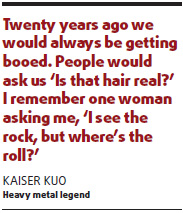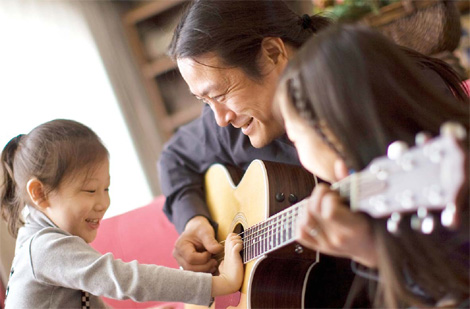'Imperial metal' strikes new chords
|
Kaiser Kuo plays guitar at home with his children. Jonah Kessel |
"I've totally had those no pants dreams," said heavy metal legend Kaiser Kuo about performing acoustic sets with his new band, Chunqiu, or Spring and Autumn.
The challenge in deviating from the heavy, electric distortion of the metal style for which he is known, is part of the drive to achieve fresh success, he admits. "I'm still trying to conquer that still right wrist so common to metal players."
But conquering new terrain seems to be what Kaiser Kuo does with a down-to-earth, intellectual lan. And these days, the 43-year-old husband and father of two is genuinely excited about where the path has taken him. Packed-houses recently for Chunqiu shows and a tri-city tour in Shandong last weekend only reaffirm that interest is growing unabated.
Born and raised in Arizona to Chinese immigrant parents ("Kaiser" is in fact his birth name), what brought China's heavy metal pioneer cum columnist cum consultant to Beijing in 1988 was a search for "the real rock musicians in China," he told METRO.
Kuo evidently did not have to look too hard because the result of this search yielded the China's very first heavy metal band, Tang Dynasty, founded by Kuo that same year. Heralding in a genre Kuo labels as "imperial metal", Kuo and his band quickly became seminal figures in the history of rock 'n' roll in China.
"I got that it was going to work here," he said. "And the people who were at all interested appropriated it so quickly, in charming ways. For example, there's a mosh pit tradition in China of line-banging, where three rows of guys link together. I've never seen this anywhere else in the world."
"It's unbelievable how much it's changed now," he continued. "Twenty years ago we would always be getting booed. People would ask us 'Is that hair real?' I remember one woman asking me, 'I see the rock, but where's the roll?'"
After 11 years together, Kuo left Tang Dynasty for the final time in what he describes as a "bad break up".
No longer in the scene, Kuo began working for a venture capital company to put on shows and support bands. But after reconnecting with singer and guitarist, Yang Meng, who he had met while on tour in Kunming in 1998, Kuo got "seduced back into it".
"When I first met Yang Mengwe must've played for six straight hours on a couple of battered acoustics in this bar," he recounted. "So we both had this kind of idea, of having a Chinese folk inflected form of rock."
"Chinese folk is so monophonic, while rock is heavy on pentatonic melodies where you can still introduce harmonies," Kuo explained.

But once together, Kuo says there was no real intention to go the acoustic route. "The real reason we started playing this acoustic stuff was that, on a lark, my son had destroyed my acoustic," he said. "Then I was in Hong Kong and decided it was time to buy myself something decent.
"Then because I suddenly had it, I started writing on it."
Still, Kuo is quick to reassure that he has not been debased to doing "strummy stuff".
"We're trying to sort of use clever arrangements to hide our acoustic guitar skill. Our lead singer [Yang Meng] actually has guitar skill, but he's only playing maybe 60 percent of the time," he said laughing.
Chunqiu, whose name refers to the Spring and Autumn Period (770-476 BC), consists of Kuo and Yang on guitar and vocals, with Kou Zhengyu also on guitar, Li Meng on keyboard, Diao Lei on drums, and the newest addition to the band, Song Yang, on bass, who joined last summer.
The name, according to Kuo, intends to capture both a vibrant and tumultuous period in Chinese history.
"What it really means is the vicissitudes - the rising and falling fortunes. It has this yinyang dualism to it." Uncharacteristic perhaps for the lifestyle that is associated with the image of a heavy metal icon, Kuo has quite comfortably settled into married life and fatherhood.
"I guess I've always known I wanted to be a dad," he said. "I guess one of the things I love is that the kids are totally interested in music and so fascinated by it."
(China Daily 01/18/2010 page28)















